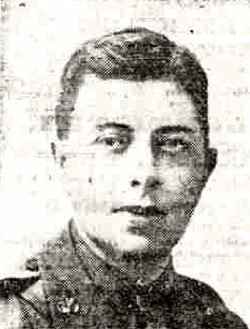Second Lieutenant Cecil Marcus King

Cecil Marcus King was born on 25 May 1888 at Shepperton, Surrey, one of five children of clerk Cecil Mowbray William King and his wife Mary Elizabeth (nee Scopes). Between 1901 and 1911 he moved to Belfast, where he worked as a theatrical box-office clerk.
King enlisted in the North Irish Horse between 13 and 19 May 1915 (No.1553 – later Corps of Hussars No.71438). He embarked for France in December that year, where he joined the 1st of 2nd North Irish Horse Regiment (probably the former).
In late 1917 or early 1918 King applied for a commission in the infantry and left France for training at No.7 Officer Cadet Battalion, Fermoy. On 31 July 1918 he was commissioned as a 2nd lieutenant and posted to the 18th (County of London) Battalion, The London Regiment (London Irish Rifles).
Soon after, he embarked for France, where he was attached to the 1/5th (City of London) Battalion (London Rifle Brigade), reporting for duty with six other officer reinforcements on 21 September 1918. King was posted to B Company.
The 1/5th Battalion saw much action during the Advance to Victory offensive in the last months of the war. On 4 November, seven days before the signing of the Armistice, they were east of Saultain, near the Belgian border. According to the battalion war diary:
4 am. Battalion assembled East of Saultain, in support of the Q.W.R.,both Battalions passing through the 2nd London outpost Line, for an attack on Sebourg. The attack was succesful and the village was captured after some little street fighting. The village was still occupied by civilians who gave our troops a great welcome. The further advance was checked by heavy M.G. fire from the high ground A15d and A22a. During the afternoon the Germans concentrated their artillery on the village and heavily bombarded the town. A defensive line was taken up in the Sunken Road, E of Sebourg and held by B and C Coys, with Q.W.R. and 33rd Brigade on our flanks. D Coy formed a defensive flank N.W. of the village, as Sebourquiaux was still held by the Germans. A Coy in Battalion Reserve at A19b.
Second Lieutenant King was listed as wounded and missing that day. In fact he had been captured, and was held at Fürstenberg prisoner of war camp until he was released later that month. He returned to Ireland in December 1918. According to a report in the Northern Whig:
Second-Lieut. CECIL M. KING, who was for several years assistant manager of the Theatre Royal, Belfast, is one of the recently returned officer prisoners from Germany. He joined the North Irish Horse in May, 1915, and gained his commission in July last in the 18th London Regiment (London Irish Rifles), and, proceeding to France, was attached to the 5th London Regiment (London Rifles Brigade). Only a few days before the armistice – in 5th November [sic] – Lieut. King had the ill-luck to be shot in the neck and taken prisoner. He had the remarkable experience of spending four days in Berlin during the revolution, and was interviewed in the Reichstag by some of the Soldiers' Council, who supposed him to be an envoy from England.
King was demobilised in 1919 and relinquished his commission on 1 September 1921. After the war he returned to England.
Image of King from Belfast Weekly Telegraph, 11 January 1919.
